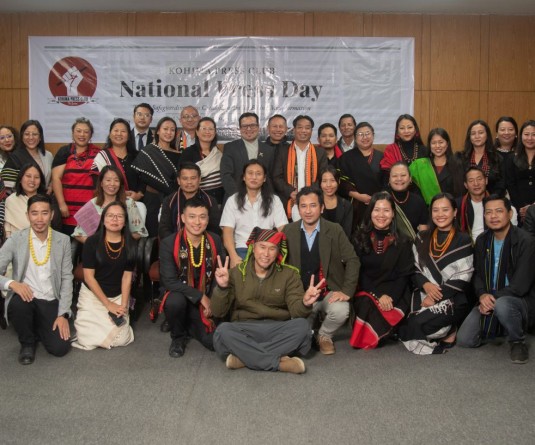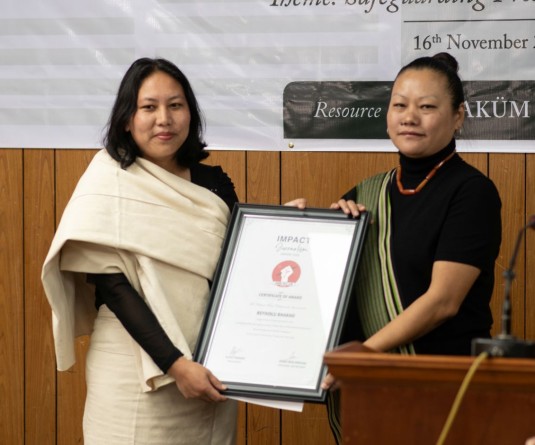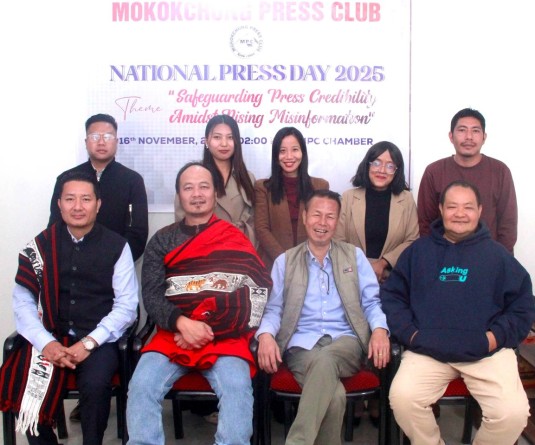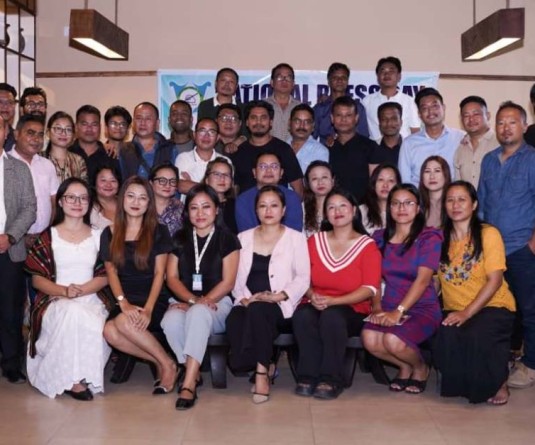
Survey highlights non-implementation of reservation polices, denial of scholarship & schemes , and accessibility.
Morung Express News
Kohima | November 3
In Nagaland, scholarships and pension schemes for the ‘disabled’ have not been provided for the last two-three years while infrastructural and accessibility constraints, among others, denies differently-abled persons their basic equal access to rights particularly in schools.
The Director of Cherry Blossoms Society Kohima, Purnima Kayina pointed this out during a press conference highlighting some pressing grievances faced by differently-abled population in Nagaland due to non-implementation of required policies.
Under the Department of Social Welfare, Rs. 2400 is allotted to people with ‘disability’ annually as scholarship or pension schemes while the Department of School Education provides Rs. 3000 annually as Escort Allowance.
She also noted that the reservation policies for differently-abled persons has not been implemented properly resulting in high level of unemployment among the ‘disabled’ graduates. In Nagaland, 5 percent of employments in government sector are reserved for people with disabilities.
As per 2011 census there were 29,631 persons with disabilities in Nagaland. People associated with differently-abled persons felt that there might be many more unidentified individuals in rural areas. Many are yet to get their ‘disability certificates.’
She further informed that a survey on 300 schools in Nagaland was conducted by 4 NGOs exploring findings and detailed analysis on the “implementation of inclusive education, disability rights and level of awareness on disability in Nagaland.”
Some major findings: According to the Survey, most of the schools are faced by infrastructural constraints with only few schools having ramps, hand rail, grab bars, anti-skid floorings according to the needs of differently-abled children. Separate toilets for boys & girls were not provisioned in most schools and more than 60% of the schools did not make any toilet provision for students with ‘disability’, it said.
While at least 23% of the schools still did not have electricity or very poor or dim lights, proper ventilations were ensured in almost all, except in 20 schools, it added.
The Survey further found out that 106 schools do not have teaching and learning materials (TLMs) as per curriculum schedule and lack adequate space and seating arrangement for children. Assistive devices and adapted furniture were absent in 60 schools.
In the area of education services, a huge percentage of teachers had never been trained to teach children with ‘disabilities’, it noted.
“A total of 250 schools, out of the 300 schools sampled, do not even have a single trained teacher to train children with disabilities,” it said adding that 274 schools reported that “resource teachers never visit their schools.”
Out of a total of 300 schools, only 3 schools have library equipped with tactile guidelines, pictorial signage, magnifying devices, Braille books, large print books, CD/DVD/ Video player/ tapes for every subject as required for different needs of the child at school.
It also underscored the need for all schools to have an inclusive curriculum or policy as 73% of the schools reported that they do not have internal policy for extra-curricular activities.
Sample data indicated very low level of integration of events/inclusive events/programmes/activities as only 5% of the schools have included children with disabilities (inclusive groups) in all school’s scheduled programmes, it said. Formation of clubs and encouraging and motivating the students, taking responsibility of mobilizing the students and community members for different school activities, etc., were negligible, it maintained adding that Village Education Committee (VEC) or local monitoring committee members were non-committal and needed to be revived.
IVC - equal rights to access education
The Survey was highlighted during a press conference held here at Hotel Japfü, Kohima to create awareness for ‘Include Vidya Campaign’ (IVC), a nationwide campaign initiated by Christofell Blinden Mission (CBM) India Trust to complement the Central Government’s flagship program- Sarva Shiksha Abhiyan (SSA) to achieve its goal of ‘Education for All’ with the objective that “Children with disabilities too have equal rights to access education.”
“This goes beyond enrolment to active learning, participation in a classroom as well as the playing field and other extracurricular activities.”
In Northeast region, the campaign is being held in collaboration with RAISE-NE (Regional Action on Inclusive Education). It includes 15 partners across 5 states (Assam, Manipur, Meghalaya, Nagaland and Tripura). The Cherry Blossoms Society, Kohima became a partner for Nagaland on April 2016.
Kayina also informed that SSA Nagaland and Director of Education have extended their official support to the RAISE project and the survey covered 300 SSA schools, with the support of Care & Support Society Mokokchung, Grace Society Mokokchung and Prodigals Home, Dimapur.
Speaking at the press conference, RAISE Advocacy Coordinator, Hirohito Habib stated that the core aim of the campaign is to increase enrollment and retention of children with ‘disability’ in schools, and gain community and parent’s commitment to the cause of inclusive education.
A rally on IVC will be held on November 4 where 23 schools in Kohima will participate to campaign for the inclusion of “Children with Disability in Education” in Nagaland.






